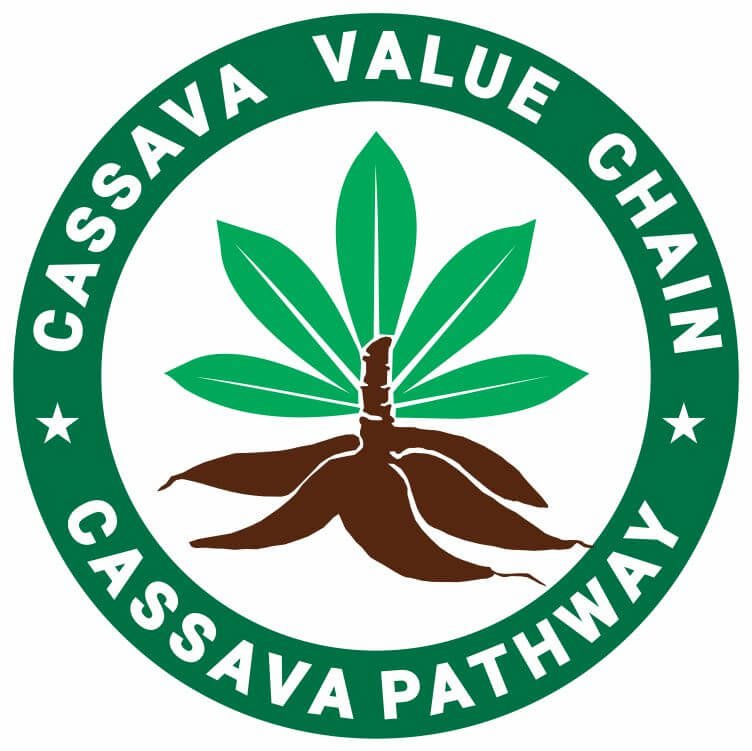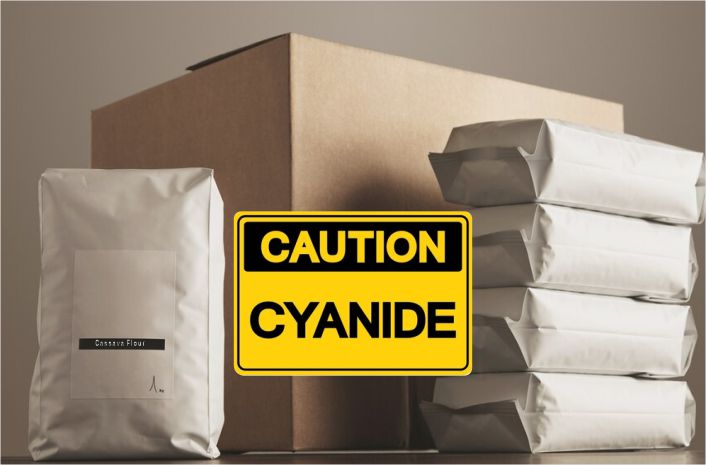Cassava root flour is popular as a gluten-free alternative. But as you consider it in your meals, you may wonder: Does cassava flour contain cyanide?
Raw cassava has natural compounds called cyanogenic glycosides that can release cyanide, a harmful substance, when not processed properly.
While cassava flour made through correct methods is generally safe, improper preparation can pose serious risks to your health.
In this article, we’ll talk about how cyanide can be present in cassava flour and what steps are necessary to ensure that the flour you use is safe for consumption.
Understanding these risks can help you make informed choices when using cassava flour in your cooking.
If you are just learning about cassava, here is a good place to start.
An Overview of Cyanide?
Cyanide, specifically in the form of hydrogen cyanide (HCN) and cyanogenic glycosides, is a highly toxic substance found in cassava. When these glycosides break down in the body, they release hydrogen cyanide, which prevents the cells from using oxygen.
This interference with oxygen use can lead to poisoning and, if severe, death. Although hydrogen cyanide has a distinct almond-like odor, it is undetectable in properly prepared cassava.
To safely consume cassava, it must be processed correctly through methods like soaking, fermenting, and cooking, which neutralize cyanide and make the flour safe for consumption. See how to remove cyanide from cassava.
Does Cassava Flour Contain Cyanide?
Yes, cassava flour can contain cyanide if it’s not properly processed. Raw cassava contains cyanogenic glycosides, like linamarin and lotaustralin.
When not prepared correctly, these compounds break down into toxic hydrogen cyanide.
By soaking, fermenting, or cooking cassava, these harmful compounds are reduced or eliminated. These processing steps ensure that cassava flour is safe to eat.
Always buy cassava flour from trusted brands that follow food safety guidelines. Properly processed cassava flour is a safe, gluten-free alternative in your recipes.
Related: Recipe for Cassava Flour Brownies
Health Risks of Cyanide in Cassava
The main health risk from cassava is cyanide poisoning, which occurs if the flour is improperly prepared.
According to Medical News Today, acute poisoning can lead to dizziness, nausea, headaches, and difficulty breathing. In severe cases, it can cause seizures, unconsciousness, or even death.
Chronic exposure to low cyanide levels can also cause long-term health problems like goiter (thyroid enlargement), peripheral neuropathy (nerve damage), and nutrient deficiencies.
The key takeaway: cyanide poisoning is preventable. Properly processed cassava products reduce these risks and make the flour safe to consume.
Recommended Posts
- Places to Purchase Cassava Flour in Bulk
- What are Cassava Flour Tortillas?
- Is Cassava Flour Gluten-Free?
- Cassava Flour vs Almond Flour
- Cassava Flour Palm Cake: How it is Done
- Cassava Flour and Coconut Flour: Which is Better?
How Cyanide is Eliminated from Cassava Flour
When it comes to cassava flour, it’s not just about the quality of the raw material, it’s also about how it’s processed.
The following methods are commonly used to reduce or eliminate cyanide from cassava products:
- Soaking: Soaking cassava in water for several hours or even days helps leach out cyanogenic compounds, including linamarin. This step significantly reduces the amount of cyanide present.
- Fermentation: Fermentation is another effective technique. During the fermentation process, microorganisms break down the cyanogenic glycosides, further reducing the risk of cyanide exposure.
- Drying and Cooking: Heat treatments, such as drying and cooking, also play an important role. These methods not only help to remove cyanide but also enhance the nutritional content of cassava.
Through these methods, manufacturers can produce safe cassava flour, with levels of cyanide well below harmful thresholds.
When properly processed, cassava is a nutritious and safe food.
Related: Is the Cassava Flour Glycemic Index a Concern?
Cassava Flour and Cyanide-Free Products
Ensuring Cassava Flour Safety
As cassava-based products become more popular, manufacturers are focused on keeping them safe for consumption. To avoid harmful cyanide levels, reputable cassava flour producers follow strict food safety guidelines.
Testing and Regulations
Leading manufacturers regularly test their cassava flour for cyanide residue throughout production. Organizations like the FDA and EFSA set limits on the allowable cyanide in food. Trusted brands conduct tests at every step to ensure their products meet these standards.
Third-Party Certifications
In addition to government regulations, third-party certifications further assure the safety of cassava flour. These certifications confirm that manufacturers use the right processing methods to eliminate cyanide.
When you buy cassava flour from reliable brands, you can be confident it’s safe to use.
Conclusion: Ensuring Safe Cassava Flour Consumption
Cassava flour is a popular gluten-free alternative, but raw cassava contains cyanogenic glycosides like linamarin and lotaustralin, which can produce toxic hydrogen cyanide if not properly processed.
Soaking, fermenting, and cooking can reduce cyanide levels, making cassava flour safe for consumption.
To minimize health risks, it’s crucial to choose cassava flour from reputable brands that follow strict safety standards.
By understanding the importance of proper processing, you can enjoy the nutritional benefits of cassava flour without worrying about harmful cyanide levels. Choose certified products to ensure safety and quality.

Chimeremeze Emeh is a writer and researcher passionate about Africa’s most transformative root crop—cassava. Through his work at cassavavaluechain.com, he explores the entire cassava industry, from cultivation and processing to its diverse applications in food, health, and industrial use.
He also writes for palmoilpalm.com, where he shares his extensive experience and deep-rooted knowledge of palm oil, covering red palm oil, palm kernel oil, and refined products. His work there reflects his lifelong connection to agriculture and his commitment to promoting sustainable value chains in Africa.
Driven by curiosity and purpose, Chimeremeze aims to shed light on how cassava continues to empower communities, strengthen food systems, and link traditional farming wisdom with modern innovation.

